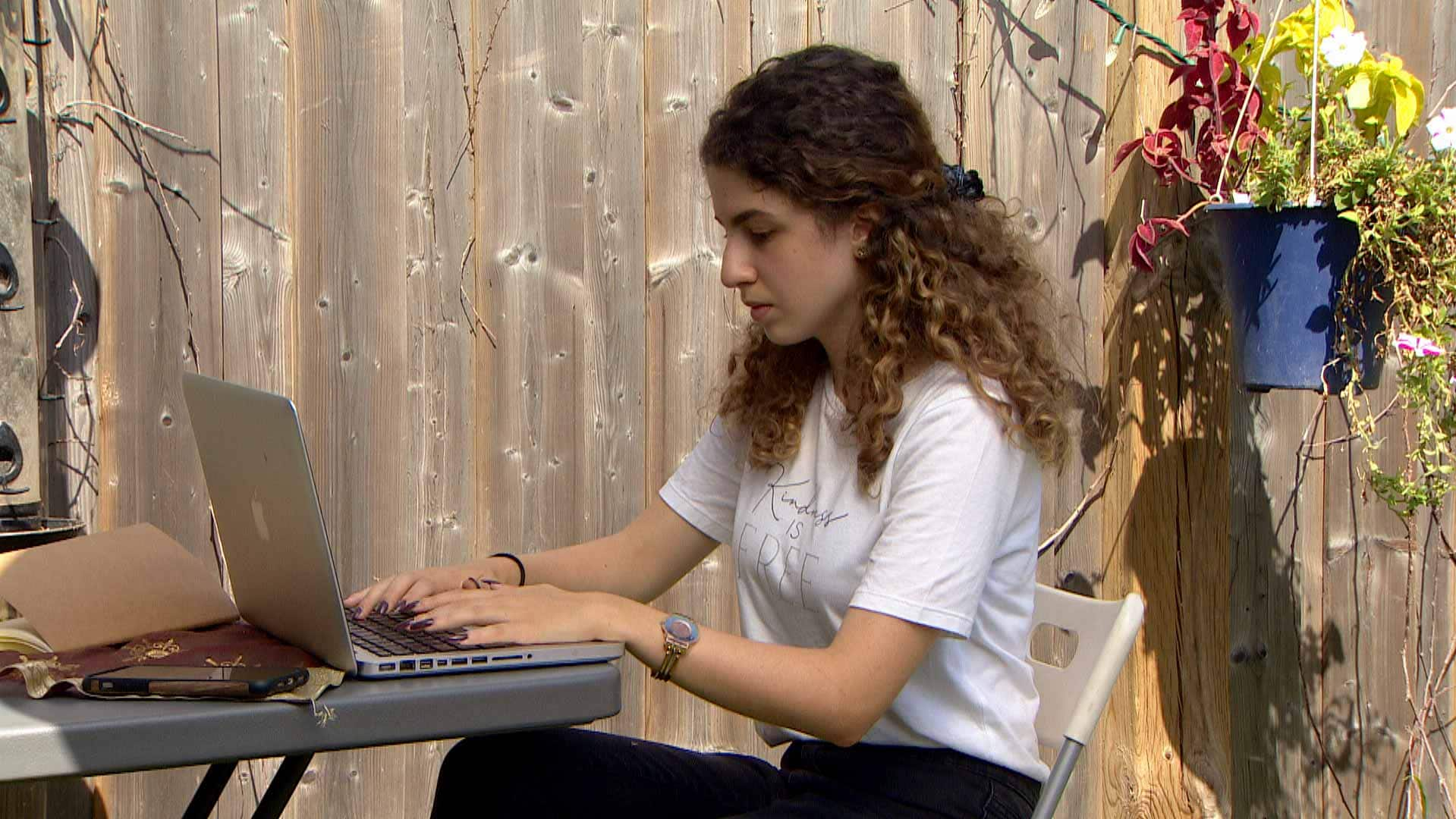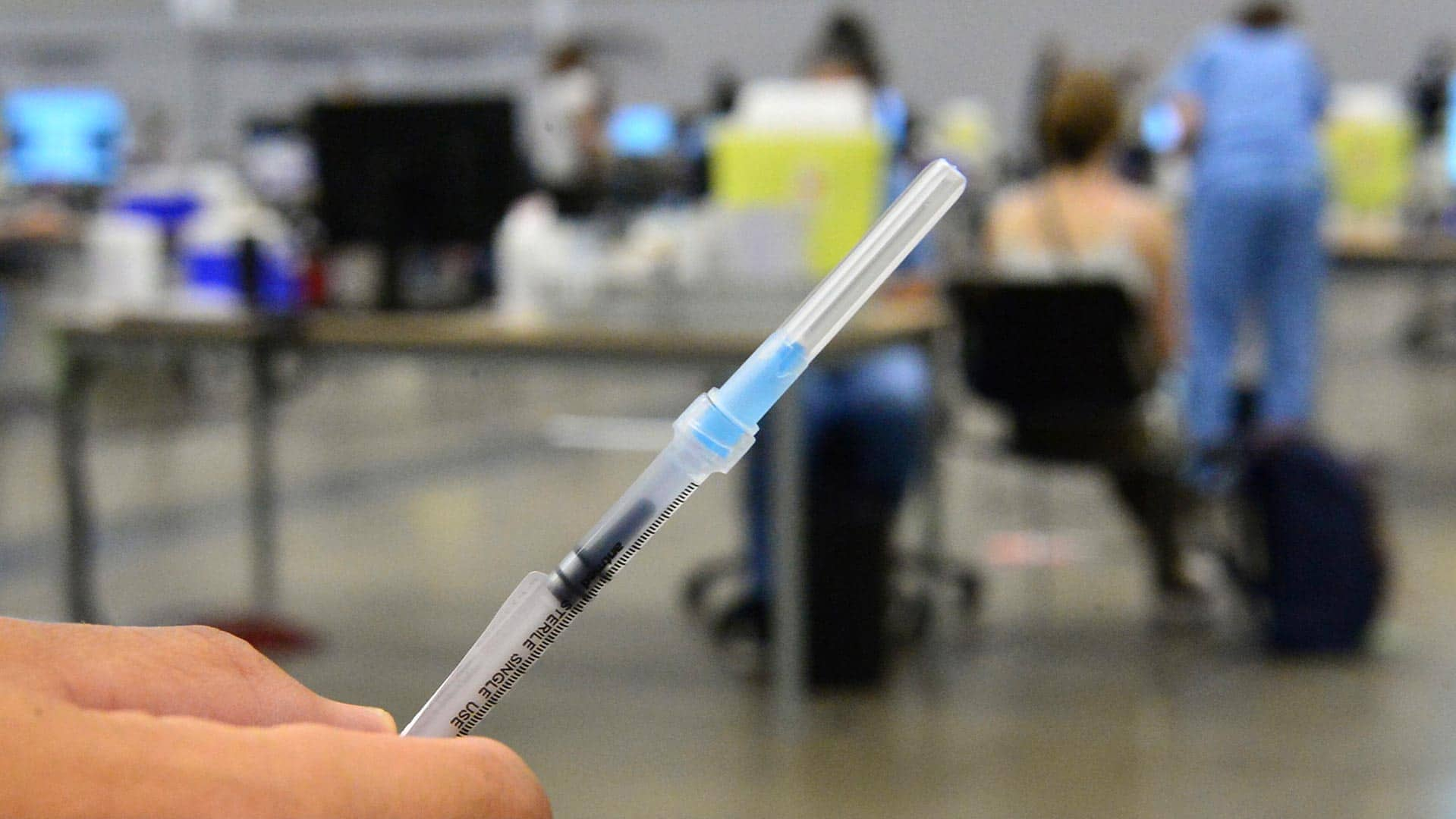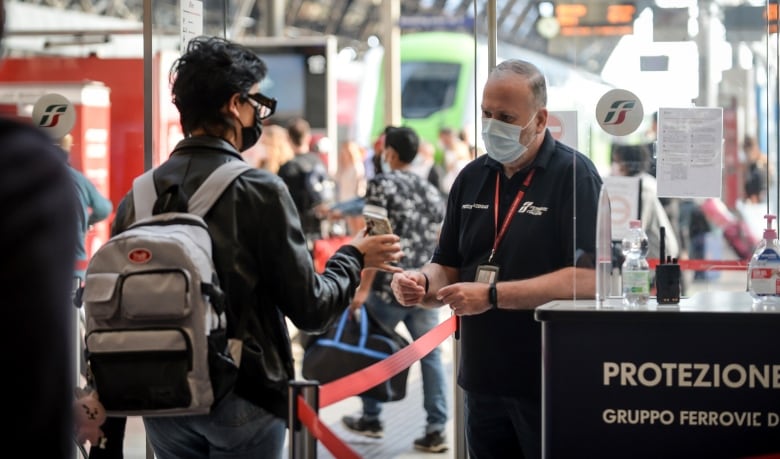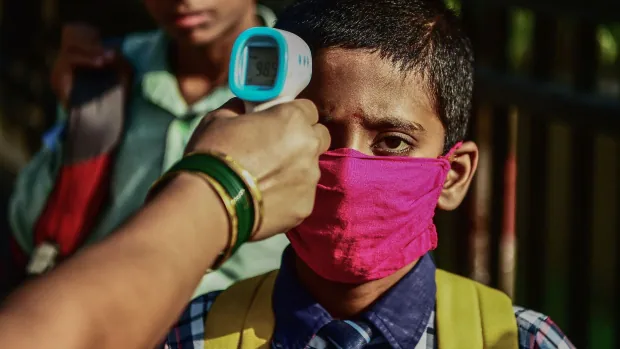More students in India will be able to step inside a classroom for the first time in nearly 18 months on Wednesday, as authorities gave the green light to partially reopen more schools despite apprehension from some parents and signs that infections are picking up again.

The latest:
- Western provinces driving Canada’s 4th COVID-19 wave as physicians warn cases ‘out of control.’
- Ontario’s COVID-19 vaccine passport plan unveiled, won’t apply to retail.
- Quebec’s vaccine passport goes into effect, limiting much of public life for those unvaccinated.
- Israel was down to a handful of daily COVID cases. Now it’s around 11,000. What happened?
- Have a coronavirus question or news tip for CBC News? Email: [email protected].
More students in India will be able to step inside a classroom for the first time in nearly 18 months Wednesday, as authorities gave the green light to partially reopen more schools despite apprehension from some parents and signs that infections are picking up again.
Schools and colleges in at least six more states are reopening in a gradual manner with health measures in place throughout September. In New Delhi, all staff must be vaccinated and class sizes will be capped at 50 per cent with staggered seating and sanitized desks.
In the capital only students in grades nine through 12 will be allowed to attend at first, though it is not compulsory. Some parents say they will be holding their children back, including Nalini Chauhan, who lost her husband to the coronavirus last year.
“That trauma is there for us and that is what stops me from going out. We don’t go to malls. We don’t go shopping. So why schools now?” she said.
Life has been slowly returning to normal in India after the trauma of a ferocious coronavirus surge earlier this year ground life in the country to a halt, sickened tens of millions and left hundreds of thousands dead. A number of states returned last month to in-person learning for some age groups.
- INTERACTIVE | Where is the coronavirus pandemic getting better or worse?
Daily new infections have fallen sharply since their peak of more than 400,000 in May. But on Saturday, India recorded 46,000 new cases, the highest in nearly two months.
The uptick has raised questions over reopening schools, with some warning against it. Others say the virus risk to children remains low and opening schools is urgent for poorer students who lack access to the internet, making online learning nearly impossible.
“The simple answer is there is never a right time to do anything during a pandemic,” said Jacob John, professor of community medicine at Christian Medical College, Vellore. “There is a risk, but life has to go on — and you can’t go on without schools.”
Online education remains a privilege in India, where only one in four children have access to the internet and digital devices, according to UNICEF. The virtual classroom has deepened existing inequities, marking the haves from the have-nots, said Shavati Sharma Kukreja of Central Square Foundation, an education non-profit.
“While kids with access to smartphones and laptops have continued their learning with minimal disruption, those less privileged have effectively lost over a year of education,” she said.

In Uttar Pradesh state, where school reopens for first to fifth graders on Wednesday after older students were allowed last month, six-year-old Kartik Sharma was excited to wear his new school uniform. His father, Prakash Sharma, said he was “satisfied” with the virus protocols the school has in place.
“The arrangements the school has made are top class,” he said.
Not all are as confident. Toshi Kishore Srivastava said she would wait before sending her son back to first grade.
“The doctors are predicting the third wave, and in this scenario sending children to schools could prove detrimental,” she said.
-From The Associated Press, last updated at 7 a.m. ET
What’s happening across Canada
WATCH | Pandemic, online learning taking a toll on children’s mental health:

Pandemic, online learning taking a toll on children’s mental health
Research suggests the COVID-19 pandemic, combined with the move to online learning, has led to symptoms of depression in 50 to 70 per cent of children. It doesn’t appear that loosened restrictions or a return to the classroom will improve the situation. 2:16
- N.B. COVID-19 roundup: Vaccine passport could be on its way but Higgs sees no urgency.
- Ontario reports 656 new COVID-19 cases, two-thirds in unvaccinated people.
- Alberta Health Services requiring employees, contracted health-care workers to be vaccinated against COVID-19.
- Would-be poll worker quits federal election gig after learning double vaccines not required.
What’s happening around the world
WATCH | Are COVID-19 vaccine booster shots necessary now?

Are COVID-19 vaccine booster shots necessary now?
Infectious diseases specialist Dr. Zain Chagla answers questions about COVID-19 booster shots and whether they’re necessary at this point in the pandemic. 4:56
As of early Wednesday afternoon, more than 217.7 million cases of COVID-19 had been reported worldwide, according to Johns Hopkins University’s coronavirus tracker. The reported global death toll stood at 4.5 million.
In the Asia-Pacific region, Moderna said its Japanese distribution partner Takeda Pharmaceutical planned to initiate the recall of three lots of the U.S. drugmaker’s COVID-19 vaccine that were suspended as Japan reported the fourth contamination case in less than a week. The country’s Health Ministry said the contaminants found were particles of stainless steel and it did not expect they would pose a health risk.
In Africa, the number of daily COVID-19 cases confirmed in Egypt has grown steadily in recent weeks amid relaxed precautionary measures and the spread of the highly contagious delta variant. The Health Ministry reported late Tuesday 279 cases in 24 hours and nine deaths, compared to 194 cases and seven deaths on the same day last week.
The delta variant first was detected in Egypt in July. Daily reported cases have gone up as authorities relaxed restrictions, allowing concerts and other large events where few participants wear face masks or maintain a distance from others.
In Europe, the World Health Organization on Wednesday inaugurated a new “hub” in Berlin that aims to help prepare the world to prevent future pandemics. The goal is to promote more effective data collection, information-sharing and analysis, leading to better and more coherent decision-making after the patchy global response to the COVID-19 pandemic.
The Italian government has vowed to crack down on demonstrators threatening to block train tracks as a rule requiring COVID-19 tests or vaccines takes effect for long-distance domestic travel.

Starting Wednesday, passengers on domestic flights, trains travelling between regions and some ferries must show a so-called “Green Pass” certifying that they’ve had at least one dose of vaccine, tested negative in the past 48 hours or recovered from COVID-19 in the past six months. Local buses, trams and subways are exempt from the rule, which was announced weeks ago.
In France, meanwhile, health workers started administering booster shots of COVID-19 vaccine to people over 65 and those with underlying health conditions to shore up their vaccine protection, as the highly contagious delta variant is spreading in the country.
People can get the shot on condition a minimum six-month period has passed since they got fully vaccinated with the Pfizer or Moderna vaccine. Those who received the single-dose Johnson & Johnson jab can get a booster shot of Pfizer or Moderna at least four weeks after they first got vaccinated.
Britain will offer people with severe immunosuppression a third dose of COVID-19 vaccine.
In the Middle East, Palestinian health authorities are launching a vaccination drive for students in the Gaza Strip ages 16-18 as the territory contends with a third wave of coronavirus infections. Palestinian officials in the occupied West Bank began a similar drive on Tuesday.
In the Americas, Brazil recorded 24,589 new confirmed cases of the coronavirus in the past 24 hours, along with 839 deaths from COVID-19, the Health Ministry said.
The largest hospital on the Big Island of Hawaii is operating at about 120 per cent of capacity amid a surge in COVID-19 cases. The Hawaii Tribune-Herald reports that Hilo Medical Center has 38 patients being treated for the disease caused by the coronavirus, including 10 in the intensive care unit. A hospital spokesperson said that as the largest hospital on the island, it can’t divert patients.
-From The Associated Press, Reuters and CBC News, last updated at 1:30 p.m. ET

